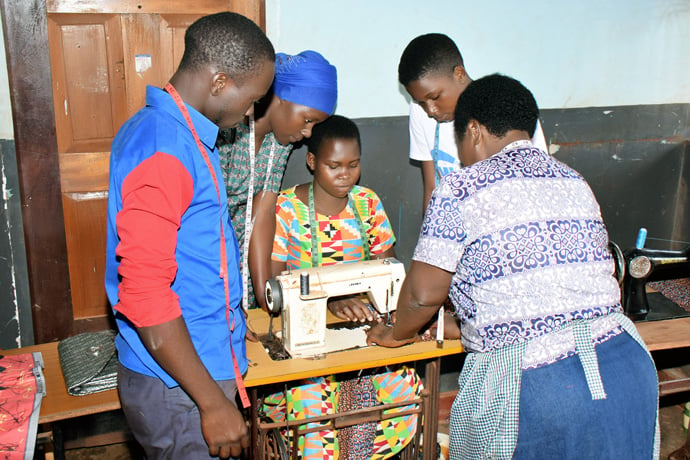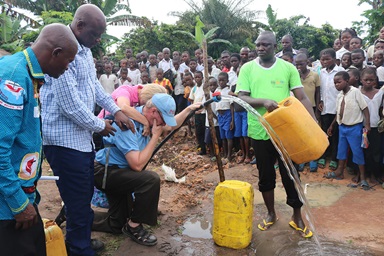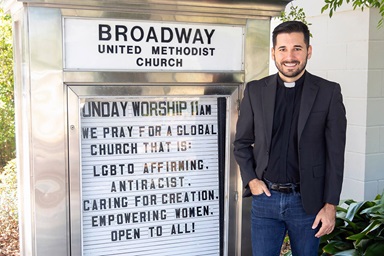Key Points:
- In partnership with Harper Hill Global, UMC Ministries handed out more than $13,000 to assist projects in the Uganda-South Sudan Conference.
- Among beneficiaries are the UMC Women Training Center in Bugembe, the Uganda United Methodist Theological College, the Luwero District motorcycle project and the Namayingo Job Training Center in Uganda.
- Susan Nabwire and other jobs-training graduates said the opportunity to become a skilled hairdresser was a gift from God.
A United Methodist women’s training center, theological college and district motorcycle project have revved up their offerings thanks to a collaboration between UMC Ministries and Harper Hill Global.
UMC Ministries is a growing, volunteer-based organization that works alongside the Uganda-South Sudan Conference, and Harper Hill Global is a Nashville, Tennessee, faith-based organization. Together, they raised $13,410 (U.S.) to support projects in eastern Africa.
UMC Ministries provides opportunities for churches, districts and institutions in Uganda and South Sudan to secure funding for projects and ministries by connecting them with The United Methodist Church’s general agencies, denominational partners and nonprofits.
The denomination’s finance and mission agencies have withheld funds from the East Africa episcopal office for nearly a decade amid continuing financial concerns. The East Africa Area today encompasses United Methodists in four annual conferences and six countries: Burundi, Ethiopia, Kenya, Rwanda, South Sudan and Uganda. Among UMC Ministries’ missions is to provide open transparency and accountability for all donated funds to United Methodist work in Uganda and South Sudan. The organization is based in Wobulenze in the Luwero District of Uganda.
The United Methodist Church Women Training Center in the Jinja District of Uganda received a $5,400 grant that will be used to purchase sewing machines to train local women.

The Rev. Lugobe Fad, who coordinates the center, said the money would help women gain self-reliance and independence and avoid gender-based violence.
The center works with women, young mothers, youth, rape survivors, displaced people, adult education students and street children. The goal is to improve livelihoods through vocational training, as well educational programs on family planning, reproductive health and gender-based violence.
Participants learn a variety of skills such as making paper bags, party decorations, sanitary pads, shoes and soap, as well as tailoring and other handicrafts.
Iryn Namugele, a beneficiary of the training center, said the lack of money for further studies led her to early marriage. “After being trained in fashion design and craftwork,” she said, “I can now sustain my family and educate my children.”
Perinah Kauma said that before learning dressmaking and tailoring, she felt alone and isolated as a rape survivor. Her parents and friends avoided her, she said.
“After the training and counseling,” Kauma said, “I now feel like God has done it for me. I can now make money from fashion design and crafted shoes and support my family.”
Fad, the center’s coordinator, also accepted a $2,500 grant on behalf of Uganda United Methodist Theological College, where he serves as dean.
“The grant has come at the right time,” he said, “as many pastors cannot afford theological education after their ministries were ravaged by the COVID-19 epidemic.”
The grant will provide library books and scholarships for 10 pastors.

Theology student Clementine Awino said the training has helped her to preach the gospel in a more informed way.
The Rev. Ddamulira Christopher, Luwero District superintendent, received $3,510 to help purchase two used motorcycles. He expressed relief that he and his assistant would have transportation to traverse the remote district in Uganda.
“The motorcycle will be used to promote the gospel of Jesus Christ in the entire district,” Christopher said.
Now they can serve pastors and congregations in locations such as Mitanzi, Katuugo and Kakoola.
“Other day-to-day issues can be attended to in due time,” he added, “and the superintendent’s itinerary can now be realized according to the program set.”
The Rev. Wilberforce Bwire is coordinator of the Namayingo Job Training Center, which received a grant of $2,000. Bwire said employment opportunities are scarce in Uganda, but with newly acquired skills, participants can find work or launch small businesses.
“The money will be spent wisely,” he said, “to train many United Methodist youth in the Busia District.”
Graduate Susan Nabwire said the opportunity to be trained as a skilled hairdresser was a gift from God. “I was hopeless with no means of income generation in my life,” she said. “But now that I am skilled, I have hope of generating income through the use of my hairdressing skills to support my family and my three children.”
Subscribe to our
e-newsletter
Charity Ajiambo, another beneficiary of the job-training center, said her husband could not fully support the family during the long COVID-19 lockdowns.
“I resorted to working on big farms day and night, a popular option for many struggling women in Uganda with very little pay, exploitation, abuse and harassment,” said Ajiambo.
“I endured just for the sake of my family's survival,” she continued. “Thanks to God for opening a door for my longtime prayer. Now that I am a skilled hairdresser, I can generate substantial income while at home. This little income sustains us all, including the very little children.”
Saphira Auma called the hairdressing training a blessing and a superb opportunity for her and other families in Namayingo. “I dearly thank whoever gave to make our lives better,” said Auma. “The only challenge is the equipment that supports our work after we graduate. But that does not hinder us.”
The Rev. Gene Ramsey oversees development at the theological college and fundraising for UMC Ministries. He thanked donors, friends and partners for their support that will ensure projects are revived.
The Rev. Nancy Neelley Hicks is founder and executive director of Harper Hill Global, which uses communications technology to improve the interpersonal and physical health of communities. She stressed the importance of building relationships to affect change.
When women in developing nations shared about the violence they endured and the opportunities they were denied, Hicks said she knew she had to be part of the solution.
“We are embodied,” she said. “We are more than only our thoughts and beliefs.”
Maiga is a communicator for the Kenya-Ethiopia Conference.
News media contact: Julie Dwyer at [email protected]. To read more United Methodist news, subscribe to the free Daily and Friday Digest.




